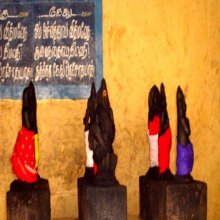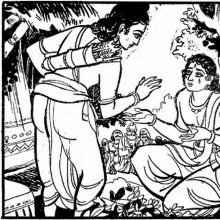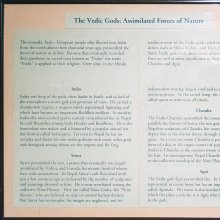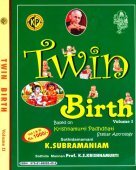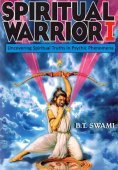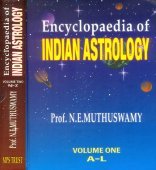Destiny: 2 definitions
Introduction:
Destiny means something in Hinduism, Sanskrit, the history of ancient India. If you want to know the exact meaning, history, etymology or English translation of this term then check out the descriptions on this page. Add your comment or reference to a book if you want to contribute to this summary article.
Images (photo gallery)
In Hinduism
Ayurveda (science of life)
Source: INSA Digital Repository: Caraka’s Approach to KnowledgeDestiny in Ayurveda was a question of vital concern to patients and physicians at all times, according to Charaka Samhita Vimana verse 3.29-38.—Charaka’s vision was universal in so far as it transcended philosophical systems and medicine. His reflections on destiny (Sanskrit: daiva), bioethics and the habitat were profound and sounded a note which resounds even today. [...]
Caraka’s consideration of destiny is as follows: “Is life span predetermined?”—[...] Caraka dealt with this question in his own way by treading the middle ground. He disagreed with the view that life span was predetermined and nobody could do anything to alter the predetermined span of life. He pointed out that this view would make human effort including Ayurveda meaningless and futile. While errors—small and large—committed in the past would have generated negative forces of karma, subsequent actions undertaken in accordance with a virtuous code of life would generate positive forces which could neutralise or even overcome the burden of the negative forces from the past.

Āyurveda (आयुर्वेद, ayurveda) is a branch of Indian science dealing with medicine, herbalism, taxology, anatomy, surgery, alchemy and related topics. Traditional practice of Āyurveda in ancient India dates back to at least the first millenium BC. Literature is commonly written in Sanskrit using various poetic metres.
India history and geography
Source: archive.org: Rajatarangini (Ranjit Sitaram Pandit) (history)Destiny or Providence is repeatedly referred to by Kalhana.—Everything seemed to happen as if the whole wanted to pursue its way by fits and starts. Human actions projected in every direction by the force of interest, passion or crime appeared to cancel each other or to become lost in nothingness. Perhaps Kalhana’s reason led him to agree with the critical philosophy of Nagarjuna, the Kant of Buddhist Kashmir, when he writes: “To begin with there is nothing, certain it is that hereafter there is nothing, during the interval, by chance, he reacts swiftly to the controlling states of pleasure and pain. Like an actor, without head and feet, having acted his part repeatedly a particular living being disappears behind the screen of existence—nor do we know where he goes”.

The history of India traces the identification of countries, villages, towns and other regions of India, as well as mythology, zoology, royal dynasties, rulers, tribes, local festivities and traditions and regional languages. Ancient India enjoyed religious freedom and encourages the path of Dharma, a concept common to Buddhism, Hinduism, and Jainism.
See also (Relevant definitions)
Query error!
Full-text (+533): Niyati, Daiva, Bhagya, Vidhi, Adrishta, Prarabdha, Gati, Bhavitavya, Kritanta, Dishta, Kalaniyoga, Bhavitavyata, Karma, Daivajna, Daivayoga, Lalata, Praktana, Kalayoga, Nashiba, Daivavasha.
Relevant text
Search found 295 books and stories containing Destiny; (plurals include: Destinies). You can also click to the full overview containing English textual excerpts. Below are direct links for the most relevant articles:
Maha Prajnaparamita Sastra (by Gelongma Karma Migme Chödrön)
II. Beings to be established in the six perfections < [Part 3 - Establishing beings in the six perfections]
Appendix 4 - Five destinies (pañcagati) or six destinies (ṣaḍgati) < [Chapter XLVI - Venerating with the Roots of Good]
Introduction (the world of transmigration) < [The world of transmigration]
Visuddhimagga (the pah of purification) (by Ñāṇamoli Bhikkhu)
Dependent Origination (iii): Consciousness < [Chapter XVII - Dependent Origination (paññā-bhūmi-niddesa)]
B. Exposition of Dependent Origination < [Chapter XVII - Dependent Origination (paññā-bhūmi-niddesa)]
Insight (5): Knowledge of Dispassion < [Chapter XXI - Purification by Knowledge and Vision of the Way]
Yoga Vasistha [English], Volume 1-4 (by Vihari-Lala Mitra)
Chapter VIII - Invalidation of destiny < [Book II - Mumukshu khanda (mumukshu-vyavahara khanda)]
Chapter LXIV - The germinating seed < [Book III - Utpatti khanda (utpatti khanda)]
Chapter LXII - Interpretation of destiny < [Book III - Utpatti khanda (utpatti khanda)]
The Concept of Tragedy < [July – September, 1983]
Poet Iqbal's Dynamism < [October 1967]
The Aim of Education < [July-September, 1928]
Mahabharata (English) (by Kisari Mohan Ganguli)
Section XX < [Kicaka-badha Parva]
Section CLXXXIV < [Markandeya-Samasya Parva]
Section VI < [Anusasanika Parva]
The civilization of Babylonia and Assyria (by Morris Jastrow)
Related products
